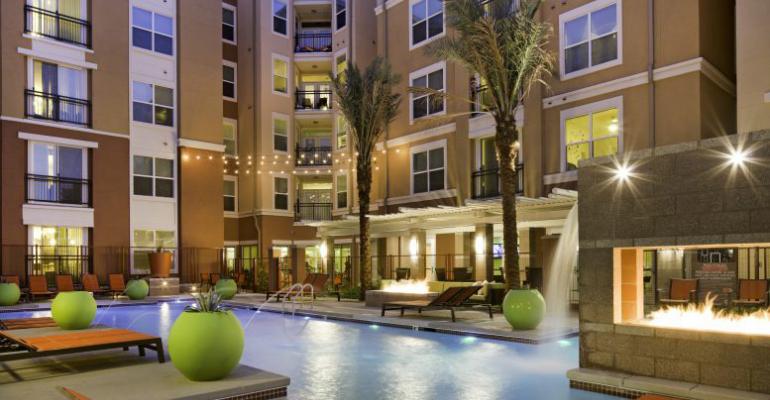(Bloomberg)—College students aren't famous for their tidiness, sober living, or financial prudence, to name three qualities landlords might look for in a tenant. But despite the beer-soaked carpets and general flakiness, renting off-campus apartments to undergrads is turning out to be a great business.
Shares in Education Realty Trust, a Memphis-based landlord whose earnings report met Wall Street expectations this morning, are up 54 percent in the past year. American Campus Communities, the only other publicly traded student housing landlord, is up 44 percent. By comparison, a Bloomberg index of North American apartment landlords is up 12 percent over the same period.
Why are the student-housing landlords getting top grades?
The long-term theme is that college enrollment has boomed over the past few decades, and investment in new on-campus dorms hasn’t come close to keeping up. In the short term, the shares are likely rising because investors are looking to hedge against the possibility of a U.S. recession.
"In an environment of striking political and economic uncertainty, public investors are ascribing value to [the] certainty of cash flows in student housing," said Ryan Burke, an analyst at Green Street Advisors. "In [the] young life of purpose-built student housing, it's performed really well in good and bad times."
That's because kids keep going to college, and schools have run out of places to put them. Consider these striking data from the U.S. Department of Housing and Urban Development: 17.7 million students were enrolled in post-secondary, degree-granting institutions in 2012, up from 12 million in 1990. Over the same period, the number of students living in on-campus dorms increased by a bit more than 600,000.
In the late 1990s, an industry grew up to absorb demand from the roughly 85 percent of students who don’t live on campus, building off-campus apartments specifically for students, offering leases by the bed, and luring renters with choice enticements. The amenities at some of the more upscale student housing complexes have drawn scorn from those who wonder: Is there a good argument for racking up student debt to watch moving screenings from your swimming pool or eat meals prepared by a James Beard-award-winning chef?
But plenty of more pedestrian complexes offer things that students want, such as barbecue pits and tanning beds, and in addition to the two publicly traded landlords, a deep roster of private property managers is getting in on the act. In March, the private equity firm Harrison Street Real Estate Capital took a publicly traded landlord private in a $1.9 billion deal.
Part of the reason to own student housing is that, in a period of low interest rates, collecting rent has looked like a good way to earn good returns, whether you're renting out a shopping mall, an office sky-rise, or a self-storage unit.
Student housing has a slightly different appeal, according to one theory. Landlords should suffer when the economy tanks, as renters lose jobs or see wages stagnate. But college enrollment has increased in recent recessions, making student housing landlords an interesting hedge against an economic downturn.
That doesn't mean developers won't eventually overbuild. College enrollment has been declining in the years since the Great Recession, even as investment in off-campus student housing has soared. At some point, there will be so many student apartments that the industry will lose its appeal as a safe haven, Burke said.
In the meantime, landlords won't mind the occasional pool party or all-night kegger, as long as the rent is in the mail.
To contact the author of this story: Patrick Clark in New York at [email protected] To contact the editor responsible for this story: Peter Jeffrey at [email protected]
COPYRIGHT
© 2016 Bloomberg L.P

